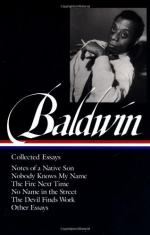
|
| Name: _________________________ | Period: ___________________ |
This test consists of 15 multiple choice questions and 5 short answer questions.
Multiple Choice Questions
1. In describing white liberal attitudes in "Down at the Cross," the author states that "they could deal with the Negro as a symbol or a victim but has no real sense of him as" what?
(a) "An intellect."
(b) "A political power."
(c) "A master."
(d) "A man."
2. In what war does the author describe many of his friends enlisting in the service to fight in the beginning of "Down at the Cross"?
(a) The Vietnam War.
(b) World War II.
(c) World War I.
(d) The Korean War.
3. The authors writes in "Down at the Cross," "Yes, it does indeed mean something - something unspeakable - to be born, in a white country, and Anglo-Teutonic, antisexual country, black. You very soon, without knowing it, give up all hope of" what?
(a) "Communication."
(b) "Redemption."
(c) "Communion."
(d) "Inflation."
4. When dd Elijah Muhammad die?
(a) 1975.
(b) 1980.
(c) 1969.
(d) 1965.
5. The author asserts in "Down at the Cross" that "a civilization is not destroyed by wicked people; it is not necessary that people be wicked but only that they be" what?
(a) "Spineless."
(b) "Ignorant."
(c) "Scared."
(d) "Isolated."
6. What word used by the author in "Down at the Cross" means relentless or unstoppable?
(a) Cultivated.
(b) Irredeemable.
(c) Advanced.
(d) Implacable.
7. The author states in "Down at the Cross" that what "and heroism have been made synonymous except when it comes to blacks"?
(a) "Strength."
(b) "Violence."
(c) "Love."
(d) "Power."
8. Where does the author claim he was when a bartender refused to serve him and some friends in "Down at the Cross"?
(a) The Chicago O'Hare airport.
(b) The J.F.K. airport.
(c) The La Guardia airport.
(d) The Sam Houston Airport.
9. In what periodical was "Down at the Cross" first published?
(a) Time.
(b) Reader's Digest.
(c) The New Yorker.
(d) Publisher's Weekly.
10. What does the author describe school revealing itself to be to the black community passing through adolescence in "Down at the Cross"?
(a) "A pursuit toward excellence."
(b) "A path to enlightenment."
(c) "A child's game that one could not win."
(d) "A segue into more fruitful endeavors."
11. The author puts forth the Nation of Islam's belief that the white man's rule will be ended in how much time in "Down at the Cross"?
(a) 50-60 years.
(b) 5-10 years.
(c) 10-15 years.
(d) 100 years.
12. When was Elijah Muhammad born?
(a) 1897.
(b) 1818.
(c) 1911.
(d) 1921.
13. The author writes in "Down at the Cross," "From my own point of view, the fact of the Third Reich alone makes obsolete forever any question of" what?
(a) "White superiority."
(b) "Love."
(c) "Christian superiority."
(d) "Black superiority."
14. Where did Rudyard Kipling live?
(a) England.
(b) Canada.
(c) Ireland.
(d) France.
15. What does the author say "changes, totally and forever, the nature of reality and brings into devastating question the true meaning of man's history" in "Down at the Cross"?
(a) "The threat of social evolution."
(b) "The ambition toward a freer world."
(c) "The threat of universal exctinction."
(d) "Hope itself."
Short Answer Questions
1. What qualities does the author claim Elijah Muhammad has invested in his followers in "Down at the Cross"?
2. What does the author claim is the only thing to "cause any of those people to treat you as they presumably wanted to be treated" in "Down at the Cross"?
3. Who is quoted as having said "It is better to marry than to burn" in "Down at the Cross"?
4. When was the Nation of Islam founded?
5. When did the Tunisians rise up against the French, according to the author in "Down at the Cross"?
|
This section contains 579 words (approx. 2 pages at 300 words per page) |

|




